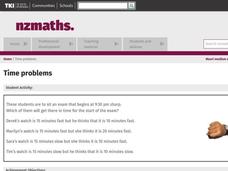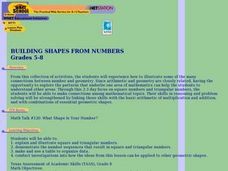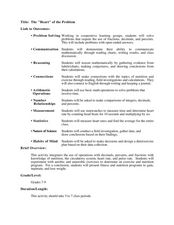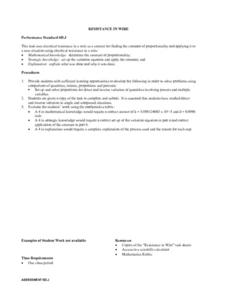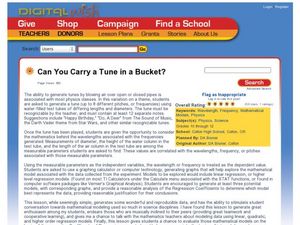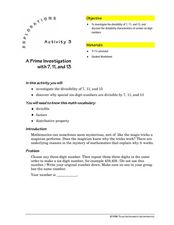Curated OER
No-Three-In-A-Line Game
Students use logic and reasoning to answer problems. Through interpreting information and results in the context to examine patterns. They examine how to solve the problems using strategy in mathematics.
Curated OER
Sandlapper Solutions
Students use mathematical thinking and reasoning to translate problems into mathematical language and thereby solve the problems. They extend their understanding of whole number operations to fractions and decimals by participating in...
Curated OER
Stars and Stripes
Students design a United States flag using reasoning. They describe their design to make it easy for it to be duplicated. They share their designs with the class.
Curated OER
The Lady's Age
Students use a game to establish the context of solving problems in a systematic and mathematical fashion. They also solve various types of equations to find reasonable solutions.
Curated OER
Weighing Time
Students devise a strategy to solve problems that is done in a systematic and mathematical fashion. The finding of the unknown value is the focus of the lesson. To solve linear equations proficiently is the skill of the lesson.
Curated OER
Time Problems
Students make sensible estimates and check for reasonable results. They also solve problems with positive and negative integers using practical activities or models as needed.
Curated OER
Triangular Numbers
Students are introduced to the problem and brainstorm ideas for approaching the problem and keeping track of what has been done. They work in pairs and share their answers, explaining their reasoning.
Curated OER
Measuring the Earth (Eratoshenes' method)
Sixth graders engage in problem solving, communicating, reasoning, and connecting to represent and solve problems, using geometric models.
Curated OER
The Secret of the Crystal Ball
Eighth graders use mathematical expressions to solve problems. In this basic properties of operations, 8th graders use prior knowledge and logical reasoning to solve equations. Students analyze an equation by solving a...
Curated OER
Logic and Proof Writing
Students define inductive and deductive reasoning and write two column proofs. In this geometry lesson, students analyze arguments and draw conclusion. They define steps necessary to arrive at the correct answer when completing proofs.
Curated OER
Building Shapes From Numbers
Students experience how to illustrate some of the many connections between number and geometry. Through this 2-3 day focus on square numbers and triangular numbers, students make connections among mathematical topics.
Curated OER
Patterns and Possibilitiies
Students gain an understanding of the value and importance of patterns in mathematics. Through video, interaction and hands-on activities, students identify concrete and abstract patterns incorporating logic and deductive and inductive...
Curated OER
Proof by Induction
Twelfth graders define and prove theorems using induction. In this calculus instructional activity, 12th graders differentiate between inductive reasoning and deductive reasoning. They review sigma notations and work proofs by induction.
Curated OER
Preparation and Transition to Two-Column Proofs
Students investigate proofs used to solve geometric problems. In this geometry lesson, students read about the history behind early geometry and learn how to write proofs correctly using two columns. The define terminology valuable to...
Curated OER
The "Heart" of the Problem
Learners explore mathematical operations while studying nutrition. In this physical fitness lesson, students explore calories, pulse rate, and the circulatory system. Learners use mathematical data to create a healthy physical fitness...
Curated OER
Significant What?
High schoolers define accuracy and precision, and differentiate between the two terms, apply the concepts of accuracy and precision to a given situation and correctly apply the concept of significant figures to measurement and...
Curated OER
When Close Enough is Good Enough
Young scholars describe the difference between an estimate and a guess. They create reasonable estimates based on observation and hands-on activities. They synthesize estimated based on interaction with online activities.
Curated OER
Resistance in a Wire
Students find the constant of proportionality and apply it to a situation. They use the electrical resistance in a wire as a context for finding the constant of proportionality. In addition, they write an explanation and justification of...
Curated OER
A Fishy Problem
Learners survey the problems involved in finding a solution to a practical problem using a mathematical process. Students make sensible estimates and check the reasonableness of their answers. Learners report the results of their...
Curated OER
WINDMILL POWER
Students study operations with real numbers using mental computation or paper-and-pencil calculations. They judge the reasonableness of numerical computations and their results. They set up and solve proportions for direct and inverse...
Curated OER
Traditional American Indian Lodges
Students explore the mathematical properties of traditional American Indian lodges. They examine the effect of increasing sides of a polygon, calculate the surface area of prisms and cylinders, and construct a classroom size pyramid...
Curated OER
Can You Carry a Tune in a Bucket?
Young scholars use water filled pipes to play a tune and consider the mathematics behind the sound waves. In this sound wave instructional activity, students play a tune with water filled pipes. They create a mathematical model to...
Curated OER
A Prime Investigation wtih 7, 11, and 13
Ninth graders investigate divisibility rules. In this middle school mathematics/Algebra I lesson, 9th graders explore the divisibility rules of 7, 11, and 13. Students examine certain six-digit numbers that are divisible by...
Curated OER
Bouncing off the Wall
Students watch a video clips before problem solving the use of angles in real world situations. They problem solve using spatial reasoning while connecting math to a sports activity that investigates the path of a bouncing ball.
Other popular searches
- Mathematical Reasoning 12
- Mathematical Reasoning Grid
- Mathematical Reasoning Shapes
- Mathematical Reasoning 1.2







